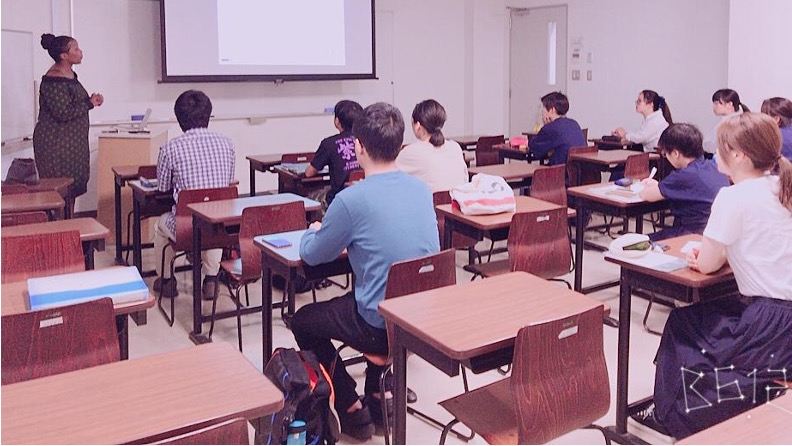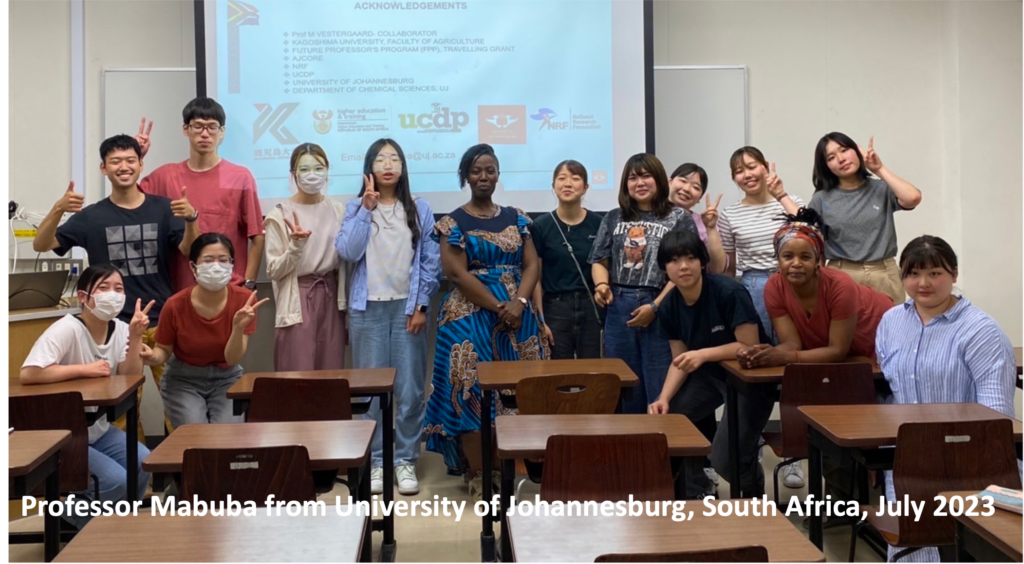Course Requirements (Subjects Offered)
The subjects in the Special Course are categorized into three main groups: “General and Foundational Education Subjects,” “Specialized Education Subjects,” and “Subjects related to Teacher Certification as defined by the Education Personnel Certification Act.”
Guide to the Special Course on International Food Resource Studies is available here .
The “Specialized Education Subjects” consist of:
The course is structured into the Agriculture Sub-course and Fisheries Sub-course, allowing students to learn both disciplines.
1. Compulsory Subjects:
Subjects that all students in the Special Course must complete to earn credits.
| 【Specialized Education in English】 | 【Strengthening Practical Skills】 |
|---|---|
|
|
| 【Basic Subjects】 | 【Practical Training and Experiments】 |
|
|
| 【Enhancing English Skills】 | 【Common Specialized Subjects】 |
|
|
2. Elective Subjects 1a
Refers to general subjects related to the Special Course, offered by the Faculties of Agriculture and Fisheries. Students can select from the following subjects:
| 【Courses Offered by the Faculty of Agriculture】 | 【Courses Offered by the Faculty of Fisheries】 |
|---|---|
|
|
3. Elective Subjects 1b
Refers to Specialized subjects closely related to the Special Course, offered by the Faculties of Agriculture and Fisheries. Students can choose from the following subjects:
| 【Subjects Offered by the Faculty of Agriculture】 | 【Subjects Offered by the Faculty of Fisheries】 |
|---|---|
|
|
| 【Common Subjects Offered by the Faculty of Agriculture and the Faculty of Fisheries】 |
|---|
|
Overseas Training (Study abroad)
Kagoshima University has academic exchange agreements with 91 institutions in 26 countries and regions. Additionally, the Faculty of Agriculture has agreements with 27 institutions, and the Faculty of Fisheries has agreements with 23 institutions. Students are encouraged to engage in exchange programs with these institutions.
| Partner Universities | Country | Agreement Date |
|---|---|---|
| Faculty of Agriculture | ||
| University of Georgia | United States | November 29, 1979 |
| Yunnan Agricultural University | China | May 11, 1989 |
| Hunan Agricultural University | China | June 2, 1989 |
| Sokoine University of Agriculture (Faculty of Agriculture) | Tanzania | August 30, 1999 |
| University of Valencia | Spain | February 7, 2000 |
| Diponegoro University | Indonesia | March 2, 2000 |
| Maejo University | Thailand | April 30, 2001 |
| King Mongkut’s University of Technology Thonburi (Graduate School of Biological Resources Engineering) | Thailand | January 16, 2002 |
| Hanoi University of Agriculture | Vietnam | March 6, 2002 |
| Keimyung University | South Korea | April 5, 2002 |
| Hanoi Trade University | Vietnam | December 25, 2002 |
| Andalas University | Indonesia | December 1, 2003 |
| Tohoku University | China | December 3, 2004 |
| Tamkang University | Taiwan | November 5, 2005 |
| National Chung Hsing University, College of Veterinary Medicine | Taiwan | April 1, 2009 |
| Kafrelsheikh University (Faculty of Agriculture) | Egypt | September 5, 2011 |
| Sichuan University Jinjiang College (Faculty of Brewing Engineering) | China | December 16, 2011 |
| Chinese Culture University (College of Agriculture) | Taiwan | October 3, 2012 |
| Rottenburg University of Applied Forest Sciences | Germany | November 5, 2013 |
| Lilongwe University of Agriculture and Natural Resources | Malawi | August 23, 2016 |
| Mae Fah Luang University (Faculty of Agro-Industry) | Thailand | November 14, 2016 |
| Pattimura University | Indonesia | December 4, 2016 |
| Saint Augustine University | Tanzania | April 19, 2018 |
| Huazhong Agricultural University | China | May 22, 2018 |
| Universidad Autónoma de Nezahualcóyotl | Mexico | January 22, 2019 |
| University of Malawi – The Polytechnic | Malawi | March 25, 2019 |
| Faculty of Fisheries | ||
| Dalian Ocean University | China | October 21, 2003 |
| Southeast Asian Fisheries Development Center | International Organization | December 3, 2003 |
| Hasanuddin University (Faculty of Marine Science and Fisheries) | Indonesia | November 17, 2007 |
| National Kaohsiung Marine University | Taiwan | February 29, 2008 |
| Canto University (Faculty of Fisheries and Aquaculture) | Vietnam | May 25, 2009 |
| National Taiwan Ocean University | Taiwan | July 15, 2010 |
| Sam Ratulangi University | Indonesia | February 8, 2011 |
| Zhejiang Ocean University | China | April 5, 2011 |
| Marine Science and Technology University | Eritrea | April 30, 2011 |
| Shanghai Ocean University | China | October 24, 2011 |
| University of Alicante | Spain | March 28, 2012 |
| San Carlos University (Faculty of Arts and Sciences) | Philippines | May 30, 2012 |
| Bangladesh Agricultural University | Bangladesh | December 13, 2016 |
| University of Santo Tomas (Faculty of Graduate Studies) | Philippines | January 25, 2018 |
| Hai Phong University (Faculty of Fisheries) | Vietnam | November 25, 2019 |
Since 1999, the Faculty of Agriculture has offered the “International Cooperation Agriculture Fieldwork Course” in Thailand and Myanmar. In 2009, a course in Vietnam was added. These programs have provided 284 students with opportunities to interact with locals, participate in farm stays, and engage in agricultural training, fostering international awareness and learning about international cooperation in agriculture and forestry.
Enhancement of English Proficiency
The special course aims to strengthen practical English skills through two types of subjects: ① English subjects directly aimed at improving English proficiency, and ② subjects designed to develop the ability to read, listen to, understand, and use specialized knowledge in English.
Building upon the previously implemented “Practical Fisheries English (Overseas Training)” as a recommended subject for the Faculty of Fisheries, this course will be further enhanced and offered as a required subject “Overseas Training.” It aims to establish practical English training by taking lectures in English-speaking countries or regions where English is widely used, and engaging in communication with students and others.


